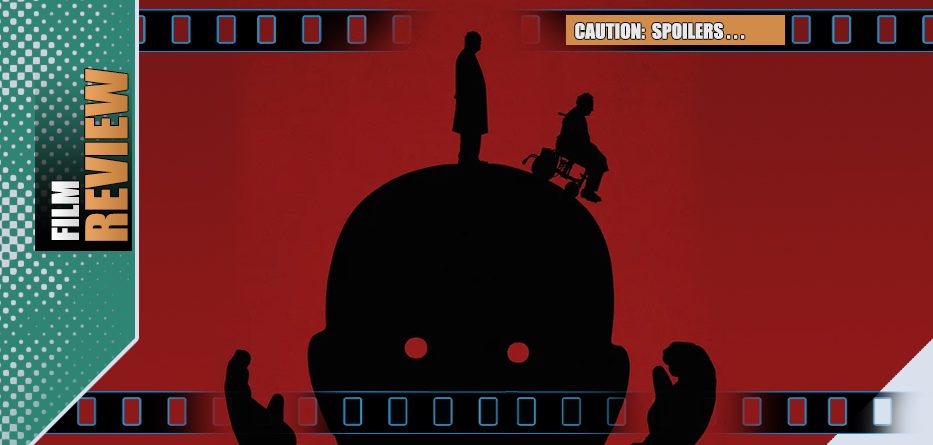When acerbic judge Stefan Mortensen (Geoffrey Rush) suffers a debilitating stroke, his no-nonsense, authoritarian world takes a hard hit. He finds himself at a care-home, Royal Pines Mews, unable to be as physically in control of his whole body and faced with staff that don’t bow to his every whim. There’s very little to keep him invested, but seeing fellow residents in various forms of end-of-life situations, he’s determined to get better and get out as soon as he can.
He isn’t interested in making friends, but he quickly begins to realise that the other residents are being terrorised by David Crealy (John Lithgow), an elderly resident with a sadistic streak. Crealy and a doll called Jenny Pen (that he carries everywhere) makes those residents bow to every whim, humiliating them in every way possible. Mortensen tries to raise the alarm on the abuse, but nobody believes him.
Mortensen is apparently the only person willing or able to stand up Crealy, but, in retaliation, the elderly resident sets the judge in his sights. He’s going to make Mortensen bow to his every whim. Or else. But even as his body fails him, Mortensen remains determined to fight Crealy and the ‘rule’ of Jenny Pen…
*spoilers*
From the poster, promotion and brief synopsis, it would be easy to believe that The Rule of Jenny Pen is a rather typical horror movie. After all, dodgy dolls and their owners have built up a rather bad reputation as anchors for more than a few fear-film franchise. But though it undeniably is a true horror movie of sorts, it is of the purely psychological variety, where there’s little need for the sinister supernatural or evil-fused ephemeral boogeymen… because here the monsters are wretched and malevolent but they are also all too human (though one of them does walk around talking to the doll of the title).
There is a character-based nastiness on show here, one that may put off some people and it certainly doesn’t make The Rule of Jenny Pen an easy watch. But unlike the sheer exploitation-fare and general misogynistic toxicity of efforts like, say, The Devil’s Rejects (which to this date I hold had virtually no redeeming features to it), Pen has a dark purpose benath its surface, highlighting the fluctuating strengths and weaknesses of people brought low by life and circumstance. In that sense, it has more in common with Whatever Happened to Baby Jane? than it does Chucky.
Amongst the grand-guignol and ‘ewwwww‘ moments – which are plentiful – the talent comes through. John Lithgow and Geoffrey Rush are long-established A-List performers and they clearly love the opportunity given to them here. Rush has played heroes and villains, but here, as Mortensen, he is an ex-judge once capable of physical and vocal forms of intimidation and – robbed of these by the major stroke – Rush really delivers the idea of a vain man struggling to find a firmer emotional and physical footing. Rush gives a physical and emotional performance that has strengths in small eye movements and facial expressions. Lithgow has played unhinged bad guys a number of times and his Crealy brings to mind the days of his 1992 collaboration with Brian De Palma, Raising Cain. The film makes him a malignant antagonist but he’s not superhuman and ultimately doesn’t really give a satisfying reason his psychopathy (Crealy eventually states that he’s tired of being overlooked and having a meaningless life, but it doesn’t feel like a sufficient motivator). So, while it’s interesting to watch a masterclass in wide-eyed, car-crash cruelty – at which Lithgow excels – it’s a shame that we don’t delve into his psyche a bit more deeply.
Director James Ashcroft, who rose to fame with another unnerving entry Coming Home in the Dark (and who will soon helm an adaptation of Alex North’s more grounded The Whisper Man with Robert De Niro, Adam Scott and Michelle Monaghan) imbues much of the tale (based on a short story by Owen Marshall) with tension and menace and there’s strong use of lighting, angle and focus to give us that helplessly askew feeling of being both a voyeur and victim. But there’s also touches of typically sharp antipodean humour in there to balance the terror as Rush’s Mortensen’s own sense of superiority and pompous self-worth are savagely stripped away.
…Pen‘s problem is more in the uneven momentum. For the middle third of its running-time it’s a merry-go-round of sheer malevolence where horrible things happen to our main cast and their supporting players and that they produce little consequence, other than to raise the tide of spit and bile. A weakness of the plot is the fact that Lithgow’s Crealy seems to wander around the retirement home / senior rest-home with abandon, with nary any oversight to keep him in check. Yes, we discover that Crealy was once a member of staff which might suggest why the current administration would believe him rather than others, but the sheer wave of obvious cruelty he inflicts in the night-time hours (and, even less believably, sometimes in broad daylight) somewhat beggars belief that he wouldn’t have had to face some closer scrutiny if not a full-on wider investigation. Crealy is duplicitous and dangerous, but he’s relentlessly intimidating rather than being as clever as he’d need to be to keep going. We see Crealy deliberately hurt Mortensen in ways that could otherwise be explained away as accidents or self-injury, but it would have been nice – and a further strength of the film – to actively have events be taken more seriously by staff and, within that, more evidence of both Mortensen and Crealy’s mental strengths being superior to those that were supposed to be taking care of their needs. Unfortunately, with no staff member really fleshed out to balance things out, we’re left with the feeling that the centre’s staff are all naive and inattentive and perhaps even culpable to the ongoing abuse around them. A third counterpoint, even if it were merely a person or obstacle to be outwitted, would have given a real pivot to proceedings and reinforced some of the observations the film makes about worth, value and position rather than just sheer growing desperation.
With perhaps less in-your-face body-horror/ continuous shock value and a slower cranking up of tension – having spasms of violence rather than a relentless conveyer-belt – The Rule of Jenny Pen could have been a stone-cold classic. However, with what we do have it’s still an unsettling, guilty pleasure, a toxic morality-play and certainly one of the welcome trend of recent films (including Scott Beck and Bryan Woods’ Heretic) where you really don’t know where the film is going to take you next… and that’s always welcome in an industry that is still often tempted to stick to formula.
‘The Rule of Jenny Pen‘ is available to watch on the Shudder platform now.

- Story8
- Acting9
- Directing8








